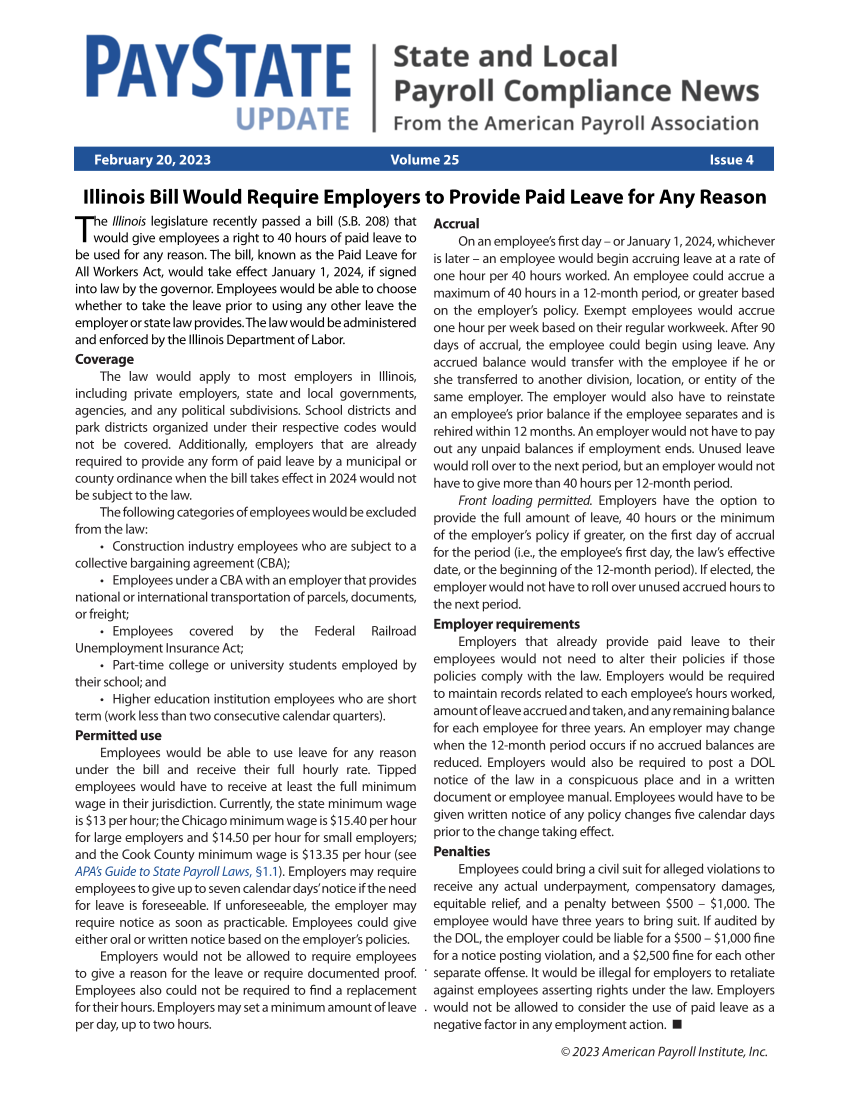© 2023 American Payroll Institute, Inc. Illinois Bill Would Require Employers to Provide Paid Leave for Any Reason The Illinois legislature recently passed a bill (S.B. 208) that would give employees a right to 40 hours of paid leave to be used for any reason. The bill, known as the Paid Leave for All Workers Act, would take effect January 1, 2024, if signed into law by the governor. Employees would be able to choose whether to take the leave prior to using any other leave the employer or state law provides. The law would be administered and enforced by the Illinois Department of Labor. Coverage The law would apply to most employers in Illinois, including private employers, state and local governments, agencies, and any political subdivisions. School districts and park districts organized under their respective codes would not be covered. Additionally, employers that are already required to provide any form of paid leave by a municipal or county ordinance when the bill takes effect in 2024 would not be subject to the law. The following categories of employees would be excluded from the law: • Construction industry employees who are subject to a collective bargaining agreement (CBA) • Employees under a CBA with an employer that provides national or international transportation of parcels, documents, or freight • Employees covered by the Federal Railroad Unemployment Insurance Act • Part-time college or university students employed by their school and • Higher education institution employees who are short term (work less than two consecutive calendar quarters). Permitted use Employees would be able to use leave for any reason under the bill and receive their full hourly rate. Tipped employees would have to receive at least the full minimum wage in their jurisdiction. Currently, the state minimum wage is $13 per hour the Chicago minimum wage is $15.40 per hour for large employers and $14.50 per hour for small employers and the Cook County minimum wage is $13.35 per hour (see APA’s Guide to State Payroll Laws, §1.1). Employers may require employees to give up to seven calendar days’ notice if the need for leave is foreseeable. If unforeseeable, the employer may require notice as soon as practicable. Employees could give either oral or written notice based on the employer’s policies. Employers would not be allowed to require employees to give a reason for the leave or require documented proof. Employees also could not be required to find a replacement for their hours. Employers may set a minimum amount of leave per day, up to two hours. Accrual On an employee’s first day – or January 1, 2024, whichever is later – an employee would begin accruing leave at a rate of one hour per 40 hours worked. An employee could accrue a maximum of 40 hours in a 12-month period, or greater based on the employer’s policy. Exempt employees would accrue one hour per week based on their regular workweek. After 90 days of accrual, the employee could begin using leave. Any accrued balance would transfer with the employee if he or she transferred to another division, location, or entity of the same employer. The employer would also have to reinstate an employee’s prior balance if the employee separates and is rehired within 12 months. An employer would not have to pay out any unpaid balances if employment ends. Unused leave would roll over to the next period, but an employer would not have to give more than 40 hours per 12-month period. Front loading permitted. Employers have the option to provide the full amount of leave, 40 hours or the minimum of the employer’s policy if greater, on the first day of accrual for the period (i.e., the employee’s first day, the law’s effective date, or the beginning of the 12-month period). If elected, the employer would not have to roll over unused accrued hours to the next period. Employer requirements Employers that already provide paid leave to their employees would not need to alter their policies if those policies comply with the law. Employers would be required to maintain records related to each employee’s hours worked, amount of leave accrued and taken, and any remaining balance for each employee for three years. An employer may change when the 12-month period occurs if no accrued balances are reduced. Employers would also be required to post a DOL notice of the law in a conspicuous place and in a written document or employee manual. Employees would have to be given written notice of any policy changes five calendar days prior to the change taking effect. Penalties Employees could bring a civil suit for alleged violations to receive any actual underpayment, compensatory damages, equitable relief, and a penalty between $500 – $1,000. The employee would have three years to bring suit. If audited by the DOL, the employer could be liable for a $500 – $1,000 fine for a notice posting violation, and a $2,500 fine for each other separate offense. It would be illegal for employers to retaliate against employees asserting rights under the law. Employers would not be allowed to consider the use of paid leave as a negative factor in any employment action. February 20, 2023 Volume 25 Issue 4
Printed for: PayrollOrg Bookshelf © 2024 American Payroll Institute, Inc. All Rights reserved. From: PayrollOrg Digital Publications (bookshelf.payroll.org)







